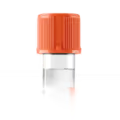Do I need a Selenium test?
Feeling fatigued, struggling with brain fog, or noticing your immune system isn't what it used to be? Could low selenium be affecting your thyroid, immunity, and overall vitality?
Selenium is a powerful antioxidant that supports your thyroid function, immune defense, and protects your cells from damage. When levels are off, you may experience fatigue, weakened immunity, or cognitive issues.
Testing your selenium gives you a quick snapshot of whether deficiency is contributing to your symptoms. It's the essential first step to personalizing your nutrition and lifestyle choices, so you can restore your energy and resilience.
Method: Laboratory-developed test (LDT) validated under CLIA; not cleared or approved by the FDA. Results are interpreted by clinicians in context and are not a stand-alone diagnosis.

A derived biomarker is a value that is calculated from other directly measured biomarkers rather than being measured directly in the lab.
Get tested with Superpower
If you’ve been postponing blood testing for years or feel frustrated by doctor appointments and limited lab panels, you are not alone. Standard healthcare is often reactive, focusing on testing only after symptoms appear or leaving patients in the dark.
Superpower flips that approach. We give you full insight into your body with over 100 biomarkers, personalized action plans, long-term tracking, and answers to your questions, so you can stay ahead of any health issues.
With physician-reviewed results, CLIA-certified labs, and the option for at-home blood draws, Superpower is designed for people who want clarity, convenience, and real accountability - all in one place.
Key benefits of Selenium testing
- Reveals whether your selenium level supports immune defense and thyroid function.
- Spots deficiency that may explain fatigue, brain fog, or weakened immunity.
- Flags excess selenium, which can cause hair loss, nausea, or nerve symptoms.
- Guides supplementation decisions to avoid both deficiency and toxicity risks.
- Protects fertility by ensuring adequate selenium for sperm quality and egg health.
- Tracks selenium status if you have thyroid disease or autoimmune conditions.
- Clarifies whether low selenium contributes to muscle weakness or mood changes.
- Best interpreted with thyroid panel and your symptoms for full clinical context.
What is Selenium?
Selenium is an essential trace mineral that your body cannot make on its own. You obtain it through food, primarily from Brazil nuts, seafood, meat, and grains grown in selenium-rich soil. Once absorbed, selenium is incorporated into specialized proteins called selenoproteins that are distributed throughout your tissues.
Your body's built-in antioxidant defense
Selenium is a key component of glutathione peroxidase and other antioxidant enzymes that protect your cells from oxidative damage. It also supports thyroid hormone production, immune function, and DNA synthesis.
A mineral that works through proteins
Unlike vitamins that act directly, selenium functions by becoming part of at least 25 different selenoproteins. These proteins act as molecular tools that regulate metabolism, neutralize harmful free radicals, and help maintain healthy inflammation responses.
Blood selenium levels reflect your recent dietary intake and your body's selenium stores. Because selenium is critical for so many protective systems, measuring it helps assess whether you're getting enough of this vital nutrient to support optimal cellular function.
Why is Selenium important?
Selenium is a trace mineral that functions as a cofactor for antioxidant enzymes, particularly glutathione peroxidases, which protect cells from oxidative damage throughout the body. It plays essential roles in thyroid hormone metabolism, immune function, DNA synthesis, and reproductive health. Without adequate selenium, your cells become vulnerable to inflammation and metabolic dysfunction.
Your thyroid can't work without it
Normal selenium levels typically range from 70 to 150 micrograms per liter, with optimal function often seen in the middle to upper portion of this range. When selenium is low, thyroid hormone conversion slows, leading to fatigue, weight gain, cold intolerance, and brain fog. Low levels also weaken immune defenses, increase infection risk, and may impair fertility in both men and women. Pregnant women with insufficient selenium face higher risks of miscarriage and developmental issues in the baby.
Too much selenium is toxic
Elevated selenium, usually from oversupplementation, causes selenosis - a toxic state marked by hair loss, brittle nails, garlic breath, nausea, and neurological symptoms. Chronic excess can damage the liver and nervous system.
A small nutrient with whole-body reach
Selenium status reflects the balance between dietary intake and metabolic demand. It intersects with iodine for thyroid health, with vitamin E for antioxidant defense, and with immune surveillance against infections and cancer. Long-term deficiency accelerates aging, cardiovascular disease, and autoimmune thyroid conditions.
What do my Selenium results mean?
Low selenium usually reflects inadequate intake or absorption
Low values usually reflect insufficient dietary intake, poor absorption from the gut, or increased losses through chronic illness or kidney dialysis. Selenium is essential for making selenoproteins, which protect cells from oxidative damage and support thyroid hormone activation. When levels drop, the thyroid may struggle to convert inactive T4 into active T3, leading to sluggish metabolism even when TSH appears normal. Low selenium also weakens immune defenses and may contribute to muscle weakness, fatigue, and increased vulnerability to infections. Deficiency is more common in regions with selenium-poor soil and in people with digestive disorders that impair mineral absorption.
Optimal selenium supports antioxidant defense and thyroid function
Being in range suggests adequate intake and efficient incorporation into selenoproteins like glutathione peroxidase and thioredoxin reductase. These enzymes protect tissues from oxidative stress and support healthy thyroid hormone metabolism, immune surveillance, and reproductive function. Optimal levels tend to sit in the mid to upper portion of the reference range for most populations.
High selenium usually reflects excessive supplementation
High values usually reflect overzealous supplementation or, rarely, environmental overexposure. Excess selenium can cause nausea, brittle nails, hair loss, fatigue, and a garlic-like breath odor. Chronic toxicity may impair glucose metabolism and increase cardiovascular risk.
Interpretation depends on assay type and clinical context
Whole blood selenium reflects recent intake, while plasma or serum levels respond more quickly to changes. Results may be lower during acute illness or pregnancy.

.svg)









.avif)
.avif)


